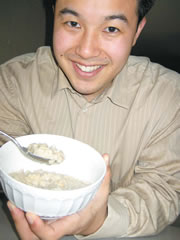Beating Cholesterol Naturally

Michael Nishimitsu enjoys a bowl of
fiber-rich oatmeal
At only 27, I was recently told by my doctor that I have high cholesterol and I’m at risk for developing heart disease. As a Registered Dietitian who eats all right and exercises, I shouldn’t be having this problem, right? OK, enough of my pity party - at least I know what I’m supposed to do to get my cholesterol under control. I’ve been given three months to improve my diet and exercise program or it’s medication for me.
Sound familiar? Heart disease affects millions of people in the U.S. and is the No. 1 killer of Americans. High cholesterol is one of many factors that puts one at greater risk of having a heart attack or stroke. The good news is that your cholesterol level can be managed, and we each have the power to control it.
So what’s the big deal about cholesterol? It’s a fat-like substance produced in your liver that is needed for important body functions like forming hormones, cell membranes, and insulation for our nerves. Cholesterol can also come from the diet if we consume animal foods such as meat, poultry, seafood, eggs, and dairy products.
A variety of reasons cause the cholesterol levels in our body to rise higher than necessary. It could be hereditary (as in my case), but the likelier culprits are not eating well and not getting enough exercise (I admit, this is sometimes my case, too.) The detriment of having high cholesterol levels is that it starts building up and attaching to artery walls, making you prone to future heart attacks or strokes. If you ask me, that’s a pretty big deal.
What are some options for managing high cholesterol?
* Choose foods low in saturated fat, trans fat, and dietary cholesterol.
Saturated fat, trans fat, and dietary cholesterol (to a lesser extent) directly affect the level of cholesterol found in your blood, especially the low density lipoprotein (LDL). LDL is the bad cholesterol that builds up in your arteries. Eating less will help lower your blood cholesterol.
* Low saturated fat foods include whole grain foods, fruits, vegetables, lean meat, skinless poultry, fish and fat-free or 1 percent dairy products.
* Trans fat has gained much attention as it has been found to be as bad or possibly even worse for your heart health than saturated fat.
Trans fat is produced when plant oils are “hydrogenated” to make them solid at room temperature. Margarine and shortening are examples, however, many processed foods contain them. Check the nutrition label!
* Dietary cholesterol is the cholesterol you eat through the animal products mentioned above. Watch your intake of foods that are especially high in cholesterol such as liver and other organ meats, egg yolks, and full-fat dairy products.
* It’s also important to manage your weight.
People who are overweight tend to have higher cholesterol levels.
Losing weight, even as little as 5 percent of your current body weight, can significantly reduce your cholesterol levels and your risk for heart disease.
* Get physical.
Aim for 30 to 60 minutes of moderate intensity exercise every day. This will help raise high density lipoprotein (HDL, a.k.a good cholesterol) levels that protect your heart from heart disease by removing build-up in arteries.
* And eat more soluble fiber.
Good sources of soluble fiber can be found in certain fruits (apples, oranges, and pears), vegetables (collard greens and carrots), oats (oatmeal and some high fiber cereals), and beans (kidney and soybeans).
Also, include plant stanols. Plant stanols, or plant sterols, are cholesterol-reducing plant ingredients naturally found in vegetables, nuts and seeds. However, they are now added to foods such as cholesterol-reducing spreads, orange juice, granola bars and yogurt. Plant sterols lower your body’s cholesterol levels by competing with dietary cholesterol for absorption.
High cholesterol is one of many risk factors that can lead to heart disease. For more information on other risk factors, and to identify some of your own risks, check out the American Heart Association website at www.americanheart.org. Make sure to seek the help of your doctor or dietitian for individualized assessment and care.
Many of my friends and colleagues find my situation amusing. I’ve extended advice to many on how to get a handle on their diet-related challenges and now the tables have turned. They now ask me, “So, Mia, what are you going to do?”
My answer: “Follow my own advice, of course!” .(JavaScript must be enabled to view this email address)
Mia Inoshita is a Registered Dietician with Meadow Gold.
E-mail this story | Print this page | Comments (0) | Archive | RSS Comments (0) |
Most Recent Comment(s):





 Del.icio.us
Del.icio.us







